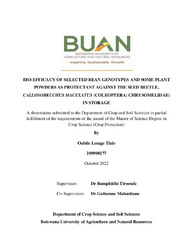Bio-efficacy of selected bean genotypes and some plant powders as protectant against the seed beetle, Callosobruchus Maculatus (Coleoptera: Chrysomelidae)in storage
Abstract
Common bean (Phaseolus vulgaris L.) is one of the utmost significant grain legumes in developing countries, however its production in Botswana has been failing to retain pace with annual growth rates due to post harvest challenges in storage. Seeds for common bean are most likely attacked by beetles commonly known as seed beetles (Callosobruchus maculatus Fabricius), which cause substantial damage to the stored common beans. Therefore, the main objectives of this study were to; (1) screen new P. vulgaris bean genotypes for resistance against Callosobrushus maculatus; (2) to evaluate the efficacy of botanical plant powders peppermint (Mentha piperita L.), garlic (Allium sativum L), fever tea (Lippia javanica) and marigold (Tagetes minuta) in the control of Callosobrushus maculatus in stored common bean (Phaseolus vulgaris); (3) to determine the effect of botanical plant powders on bean genotype germination. A total of 3 new bean genotypes CAL96, DAB520 and X-genotype and blackeye cowpea as control were used. The seeds resistance experiment was arranged in a Complete Randomized Design (CRD) replicated four times. The seeds were evaluated on the basis of number of eggs laid, number of adult emergences, number of adult mortalities, seed weight loss and Dobie Susceptible Index (DSI). The observed results showed that CAL96, DAB520, X-genotype and black cowpeas landrace (control) supported C. maculatus oviposition but only control supported adult emergence while the other seeds recorded 0% of adult emergence. CAL96, DAB520 and X-variety also had an average seed weight loss ranging from of 1%, to 2%, and based on the DSI which measures resistance and susceptibility. CAL96, DAB520 and X-variety recorded an index of 0% which suggests they are resistant while control recorded an index of 8.3% making it susceptible. Biochemical traits, ash, moisture, crude fat, protein, carbohydrates, crude fiber, tannins, sodium, potassium, calcium and magnesium contents were investigated to determine their effect on susceptibility index. Only sodium, potassium, ash and magnesium proved to be responsible for the susceptibility and or resistance of the genotype to C. maculatus. On the second experiment, different plant powder extracts were screened for efficacy in controlling C. maculatus on stored bean seeds. The experiment was arranged in a split plot design, with plant powder treatments (garlic, peppermint, fever tea and marigold) as the main plot and genotype (CAL96, DAB520, X-variety and black cowpeas landrace (control) as the subplot. This was laid out in a Complete Randomized Design and it was replicated viii three times. Four grams of all the plant powder extracts were observed to be significantly effective against C. maculatus in the bean genotypes with respect to oviposition percentage, adult emergence, and adult mortality. The extracts of marigold, fever tea and garlic decreased seed beetle oviposition on all the seeds, while peppermint extract increased seed beetle oviposition in all the seeds. Emergence of the F1 from the eggs laid on the seeds was only observed in the blackeye seeds. Peppermint powder treatment recorded the lowest emergence percentage with an average of 1.05% emergence, while fever tea had the second lowest adult emergency and garlic had the third and marigold the fourth with an average of 2.9%, 3.48% and 11.75% adult emergence respectively. Adult mortality percentage among the treated and untreated control were observed in the present study, where the peppermint and marigold powder treatments were the only treatments to have recorded a significant adult mortality with an average of 1% and 6.67% respectively. In seed weight loss experiment, marigold powder and the untreated control were the least effective as they recorded 0.5% and 1.33% reduction in seed weight due to C. maculatus infestation. The results from the DSI indicate that all the powder treatments had an index value of 0%, which means all genotypes were resistant against C. maculatus. The results from the present study indicates that garlic, peppermint and fever tea and marigold powders have anti-ovipositional properties, insecticidal effects, repellent activity, and permanent protective properties on CAL96, DAB520, X-variety, and blackeye cowpeas against damage from C. maculatus. Effects of plant powder fever tea, peppermint, garlic and marigold on germination on seeds of CAL96, DAB520, X-variety and blackeye cowpea were evaluated. The experiment to evaluate the efficacy on germination was also arranged in a split plot design, laid out in a Complete Randomized Design with 3 replicates. Seeds treated with garlic, fever tea and marigold treatments were observed to have recorded the highest average germination percentages which were 100, 99.17 and 97.5 percent respectively, peppermint recorded the second lowest average germination percentage which was 85.83 percent. The untreated control recorded the lowest average emergency percentage of 77.5. Growth activity on all the seeds by plant powders were reported. This study demonstrated the efficacy and the high control potential of plant powders against C. maculatus in storage while they are effective in promoting seeds germination in all the seeds. According to Dobie’s Susceptibility Index, garlic and peppermint performed very well.
Collections
- Theses and Dissertations [133]

